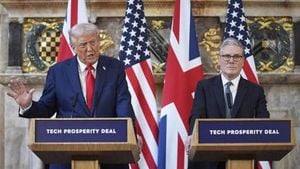SpaceX's ambitious plan to launch nearly 23,000 satellites as part of its Starlink program is hitting turbulence from the Ukrainian-American community. The Ukrainian Congress Committee of America (UCCA), alarmed by CEO Elon Musk's alleged connections with Russia and reports of Starlink's utilization by Russian forces, has officially petitioned the Federal Communications Commission (FCC) to halt SpaceX’s expansion efforts.
The crux of their concern revolves around Musk’s role during the Ukraine-Russia conflict and the potential misuse of SpaceX’s satellite technology. The UCCA's petition, filed recently, emphasizes the need for serious scrutiny of Musk’s engagements with the Kremlin, especially since these conversations sparked alarm among various federal officials and members of Congress.
While Starlink has played a pivotal role in sustaining internet access for Ukrainians during the war—Starlink terminals were sent to Ukraine shortly after the Russian invasion began—Musk's controversial decisions have marred his reputation within the Ukrainian community. Certainly, the launch of Starlink has provided much-needed connectivity, but concerns have arisen about its dual-use potential.
The UCCA’s petition raises the question: has Starlink inadvertently facilitated Russian operations? President Michael Sawkiw Jr. expressed the pressing nature of the inquiry, stating, “If yes, this is not in the national security interest of Ukrainian-Americans, or of the entire country.” This pointed question highlights the delicate balance between technological advancement and moral responsibility.
Adding to the unease is Musk's reported decision back in 2022, where he obstructed Ukraine from deploying drones for an attack on the Russian naval fleet by disabling Starlink services over Crimea. This act raised eyebrows across various factions, with officials scrabbling to understand Musk's motivations.
Further complicity is suggested by articles linking Russian installations of Starlink terminals with their Shahed drones, which have been instrumental during military offensives against Ukraine. While Musk previously labeled claims of providing services to Russia as “categorically false,” skepticism remains prevalent.
Aside from these operational concerns, the environmental repercussions of additional satellite launches loom large. Critics are also worried about the ecological toll of SpaceX’s ventures from their Texas launch site. The influx of space debris coupled with potential impacts on global communication infrastructure could spell long-term consequences for climaxing global satellite activity.
Meanwhile, within the U.S., communities with Ukrainian heritage—approximately 2 million strong—are increasingly vocal against actions perceived as enabling adversaries. The emotional weight of the conflict has driven this community to advocate vigorously for accountability, as any collision between their interests and SpaceX's business ambitions could stir significant backlash.
Members of Congress, echoing the UCCA's sentiments, are pushing for formal investigations surrounding Musk's communications with Russian President Vladimir Putin. These calls have been amplified by recent revelations about private discussions held prior to the 2024 elections, raising ethical questions about corporate interests intertwining with geopolitical consequences.
Seeking assurance on multiple fronts, the UCCA's petition denotes not only opposition but also serves as a signal to the wider international community—a call to prioritize oversight on corporate engagements with potentially hostile states. The group’s urgent appeal reflects growing discontent among those worried about their communities’ safety and the broader ramifications of business dealings on national security.
With SpaceX's continued expansion of Starlink and its role globally, particularly amid tense geopolitical climates, observers will be keeping watch on how these developments play out. Balancing progress with responsible governance poses significant challenges, and as the stakes rise, both SpaceX and the U.S. government may face mounting pressures to navigate this complex situation carefully.



